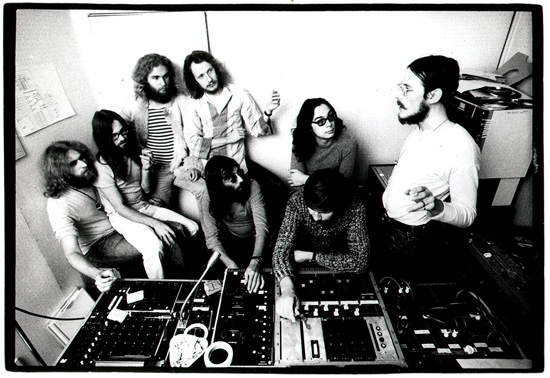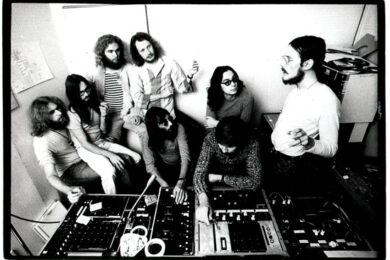
Faust: The Sound of the 80s
Ian MacDonald, NME, 3 March 1973
A LOW BUZZING sound, at first almost subliminal, emanates from a position somewhere between the twin stereo speakers. It wavers, hesitantly, from side to side – and then spreads out into all the channels, intensifying in volume, until one end of the room is transformed into a wall of drizzling white noise.
Some music can be glimpsed vaguely on the other side of this translucent electronic barrage, presumably the group playing the intro to their first number. But no, it’s the Stones singing ‘I Can’t Get No Satisfaction’.
And before you can sort this out and start wondering about copyright and how are they getting away with this and what’s it for, ‘Satisfaction’ has disappeared, receding back into the aural haze – which is still swelling in volume, as if stung to irritation at being interrupted.
And now here comes the Beatles’ ‘All You Need Is Love’: a tiny snatch to answer the Stones’ complaint that immediately fades back through the drizzle.
A couple more seconds, and the electronics abruptly cease. Wipe out. Somebody shouts something incomprehensible into the ensuing silence; it might have been English or German, but again you aren’t given the chance to muster your thoughts because a piano has begun to play.
Some recognisable chords in a fragmented time-signature give way to atonal dislocation. False start? Now the pianist tries a second idea, you grasp the tempo, and – at last – the group enters in force.
You realize why the preamble was necessary: quite simply, Faust sound like nothing else on earth.
The few minutes I’ve described can be found on Faust’s first album, released in Britain in mid-1972 six months after it was recorded in a converted ex-schoolhouse near the village of Wumme, just outside Hamburg.
Noting all the minor innovations in rock since Lennon and McCartney hauled the music bodily out of the twelve-bar trap of rock-and-roll and rhythm-and-blues – noting Brian Wilson’s visionary production job on ‘Good Vibrations’, noting the experiments half-completed by the Velvet Underground and the United States of America into the sound-limits of a Late Sixties rock-group, noting Captain Beefheart’s casually suggested fusion of primitive blues with free jazz ("free rock", in fact) on Trout Mask Replica, and forgetting neither ‘A Day In the Life’, ‘Tomorrow Never Knows’, or ‘I Am The Walrus’ – taking all of these contributions into account, I have to say that the implications of what Faust are doing form the most significant conceptual revolution in rock for ten years.
Why should such a revolution have occurred in a country which has next to nothing in the way of a rock tradition (inasmuch as it’s possible to speak of "traditions" in a field which, at the most, encompasses, only two decades)?
Precisely because of that absent tradition – and it’s no coincidence that the first writers to recognise this were from France, a country likewise lacking in rock "roots".
Rock & Folk‘s Philippe Paringaux has observed that the more adventurous of the German bands owe their experimental precepts to the fact that, possessing neither the traditions nor the temperaments of American and British rock musicians, they "view rock as it’s played in its lands of origin with a certain amount of detachment, eliminating to the best of their ability any attempts to reproduce a ‘feeling’ which cannot belong to them…taking no more from American or British rock than a state of mind".
Listening to Faust, who are by far the most extreme of the German experimental bands, one can indeed discern that which might be termed "the rock consciousness", but at the same time one is forced to admit that (on Faust’s first album, at least) the element of rock in the group’s work is neither crucial, nor particularly salient.
Faust, at their least compromising, simply play music using instruments developed through rock.
Uwe Nettelbeck is Faust’s producer, adviser, and encourager. He formed the band in early 1971 at the request of a Polydor A&R man who was looking for the definitive "detached" German rock-group.
"The idea," Uwe recalls, "was not to copy anything going on in the Anglo-Saxon rock scene – and it worked. I like Faust more than I like the Beach Boys or the Velvet Underground or the early Mothers, because their music is just not ‘industrial product’.
"They’re not ‘professional’ in that sense – they’re just trying to be themselves and put out nothing but their own music.
"I’ve always liked the idea of releasing records which lacked conventional ‘finish’ in terms of production, but which have that private thrill of spontaneity that I miss in the business.
"In other words: the records should sound like bootlegs, as if recorded by somebody who passed a group rehearsing or jamming and then cut the recorded material wildly together."
Because of the demands of a commercial company, this idea has only been partially realised on Faust’s two records (a glimpse of it can be heard in ‘Why Don’t You Eat Carrots?’ from the first album), but I’ve heard selections from the band’s private tapes, recorded continuously over the past two years, and this collaging technique, in its undiluted state, is one of Faust’s most radical conceptions.
It differs primarily from the kind of sound-collages made by Frank Zappa in that Zappa is creating ambiguites by juxtaposing apparently unrelated ideas (including ad-libbed speech, musique concrete, and finished – and self-sufficient – songs).
In other words, part of Zappa’s talent is purely organisational. He organises the sounds he’s predetermined and creates continuity where none existed before (by simple virtue of the components being separate).
On the other hand, the components of Faust’s music aren’t conceived as separate. They take the notion of continuity so much for granted that one sometimes gets the feeling that, behind that amazing rapid-fire of successive musical images, there was once a straight-forward, unassuming little 12-bar.
Faust aren’t, like Zappa, trying to piece together a jigsaw with the parts taken from several different jigsaw sets; they’re taking a single picture (which may be extremely unorthodox in its virgin state), chopping it into jigsaw-pieces, and fitting it together again in a different way.
Both methods have their order and logic, but Faust’s has to be the less contrived in that their materials are from a single body of musical thought.
In their earlier stages (for, it must be admitted, Faust have recently – at least, on their second album, So Far – ceased to explore the innovation) this New Continuity was as organic as the band’s entirely processed sound, ie, it was the music, not just an organised embellishment of it.
Once again, a French critic put his finger on the particular quality of the urgency this feature of Faust’s music possessed; Christian Lebrun wrote (in Best): "Bob Dylan, believing that the Cuba Crisis would let loose an atomic cataclysm, composed ‘A Hard Rain’s A-Gonna Fall’, in which each line was the idea for a separate song he didn’t believe he would have time to write.
"Faust’s music is a bit like that; each musical phrase, each fragment, each quotation seems to be a part of a whole music that time is pressing them to play."
How did Faust arrive at this concept? By simply investigating the technology of the rock medium in the same way that they arrived at synthesizing, not one sound or instrument, but the whole group; by really looking at the art and meaning of magnetic tape-editing, and then cross-indexing this with the naturally interrupted continuity of everyday experience.
And they arrived at the sounds to fit this structure simultaneously with finding a rationale for the purely technological side of the group’s set-up: because they were the same discovery.
The fact that hardly anyone in the world has found a theory and an integrated role in music for electronically-produced or altered sound except this German rock group is much more of a cultural vindication for our music than William Mann’s acceptance of Sgt. Pepper – because here rock has outstripped mainstream music, not imitated or genuflected to it, as Tony Palmer believes it should.
Contemplating the electronic Mephistopheles that Faust had to invoke to reach this position, Philippe Paringaux points out that the band "risk nothing less than the loss of their soul" – which is exactly what most of the parallel experiments in mainstream have foundered on.
Perhaps because of the group’s own vision, perhaps because of Uwe Nettelbeck’s taste and acumen (there being a lot more going on at Wumme than Faust), Faust have kept body and soul intact while sending rock a vertiginous step forward in its evolution.
© Ian MacDonald, 1973
Rock’s Backpages is an archive of the best music writing and criticism of the past 50 years. Sign up here for the weekly RBP newsletter, listing all new additions to the library
Faust play the Quietus Village Mentality Stage at Field Day on August 6th. They join Omar Souleyman, Anna Calvi, Gruff Rhys, Konono No 1, Mark Kozelek, About Group and The Sea & Cake. For more information and tickets, visit the Field Day website.



